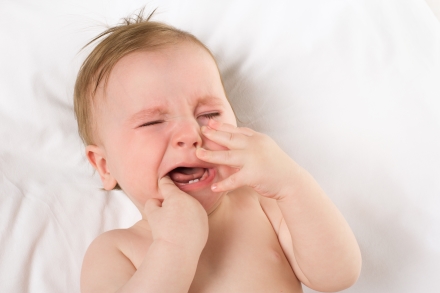Teething
When babies begin teething they will usually have periods of increased fussiness and disruptions in their sleep. Every baby will respond differently to teething, but you may see an increase in drooling, how often Baby puts their hands in their mouth, and more frequent night wakings. Most babies will get their bottom front teeth first, followed by the top front teeth. You may notice swollen, red gums along with the drooling and behavioral changes.

Sleep disruptions are common
Remember that sleep disruptions will continue to happen throughout your baby’s first year with different events like teething, illness, approaching developmental milestones, or other changes in your family’s typical routine. Waking up several additional times during the night can feel devastating for already exhausted parents. Consider asking a trusted friend or family member to come over so that you can take an afternoon nap—a nap that lasts over 90 minutes can do wonders for you as it allows your brain to get a full sleep cycle. In terms of your baby’s discomfort, consider offering them frozen or cooled teething toys, and speak with your baby’s pediatrician before using any pain relievers.
